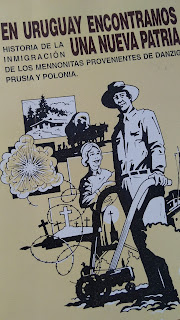From Poland to Uruguay
My sister-in-law was born in Uruguay. She is part of the large mennonite community from Danzig, Prussia and Poland that migrated on the "Volendam" ship to first, Uruguay then Buenos Aires and finally Paraguay on WWII, thanks to the help of the Canadian government. In the book above, written (also in German) by Johannes Bergmann, he narrates the process and though I just flipped through the pages while having a conversation with my sister-in-law, I couldn't help but feel such a sense of respect for these people. None of them had Spanish language skills, and after working in military camps provided by the CCM (Central Mennonite Committee) they started looking for a piece of land (they mortgaged through the bank) an hour away from Montevideo, where they not only strived but actually lived a dignified life from the product of their previous skills.
Mostly farmers and milk producers, they created "The Flowers of the Black River", a small agricultural cooperative in 1950. Claldy became the dairy products company, the cooperative built, now 50 years in operation. My sister-in-law's family (on the father side) were part of "El Ombú" community which was the last group of migrants that arrived in 1951. According to this website, there is around 70 families that still live with the same faith and traditions that those who colonized the region.
It's funny how, small details were always present, like her mother, (grandmother to my nieces and nephew) used to make pierogis and also empanadas. Every Christmas, my brother and my sister-in-law, decorate their tree with lit candles and since they were little, my nieces came over to kiss everyone goodnight after uttering "Gute Nacht". Fluent in German, my sister-in-law has kept the uruguayan accent which is very close to the accent from Argentina [I know, people from outside of Mexico think people talk the same way from all the different states in Mexico].
The book also traces all the descendants from the colony every few years, to their last update and publication which was around 2005. My brother and his wife were in Marseille back then and my niece had just been born. So much has happened since, yet I love how is it, my nieces and nephew belong to a larger group of people that come from the same essence of resilience and love for nature. I find it incredible that though migration is not desirable for anyone, when it happens out of necessity and solved through cooperation of other countries (in this case, the US with a clinic, Switzerland and others), things bloom, and become a force of values, traditions and well, little pieces of flesh and soul, in the shape of nieces and nephews, so perfect, that have now, become part of my family... "Volendam" ship included.



Comments
Post a Comment